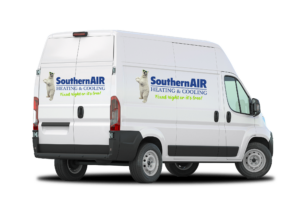Hurricanes and other major storms cause major damage to HVAC systems. When a home is demolished or blown off its foundation by a storm, the HVAC system is usually totally destroyed as well. Lesser damage to the home may mean lesser damage to the HVAC system.
The condensing unit is typically located outside your home and it is the component of your HVAC system that takes the brunt of abuse from storms. The first thing you should do for your air conditioner just before the storm hits, is to turn off the switches and breakers to your outside condensing unit. There may be a power failure and you do not want your system to start up immediately when the power comes back on. You want to make sure the system is safe and secure to operate before you turn it back on when the power does come back. Your best option is to call Southern Air Heating, Cooling & Plumbing and arrange for a technician to make an overall safety and operational check before you resume normal usage.
Storms can damage HVAC systems in many ways. Floodwaters can cause serious corrosion damage to condenser coils. Water in ductwork can lead to residual moisture that results in mold growth and circulation through the air conditioning ventilation system.
Hurricane winds blow a great deal of dirt, dust, and debris into the air that can clog up condenser coils on air conditioners. Clogged condenser coils hamper an air conditioner from adequately cooling, causing condenser motors to work harder and consume more power. Using just a garden hose, a service technician can clean condenser coils and restore the unit to normal operation. A homeowner can easily see if the coils are clogged and could wash away the dirt and debris that needs to be removed, but you should have a service technician examine your entire system to make sure everything is operating properly before turning it on. The thin aluminum fins on the outside of the condenser could have hidden damage from flying debris that might not be apparent.
Trees, building materials, and other large objects can damage the outdoor unit. Depending on the amount of damage, it may be necessary to replace the entire unit. You will want to make sure that any replacement unit is sized correctly to match up with your inside unit.
A typical condensing unit weighs between 150 and 200 pounds. When the wind speeds are up to 160 miles per hour, it is not uncommon that units simply blow over or blow off of their ground pad. If the refrigerant line was broken when the unit was blown over, there is a real risk that the refrigerant has been contaminated and significant additional damage will be caused if the unit is turned back on. If you did not have your HVAC system power turned off before the storm hit, get it turned off before the power comes back on to avoid additional damage.
Major storm damage is an upsetting experience for homeowners. Southern Air Heating, Cooling & Plumbing is here to help you and our community recover and rebuild in these difficult times.






